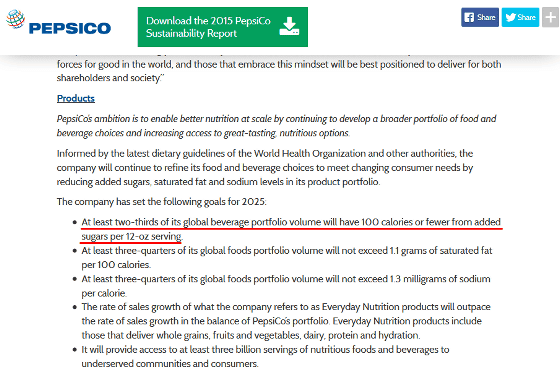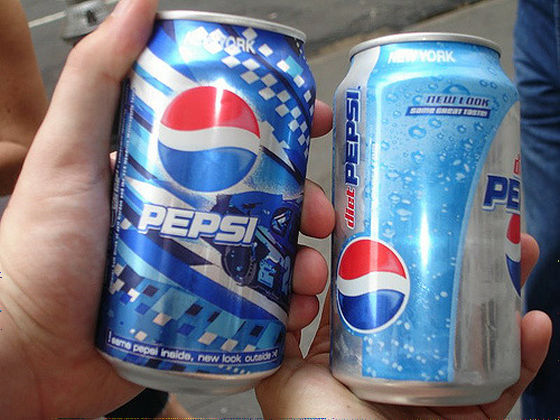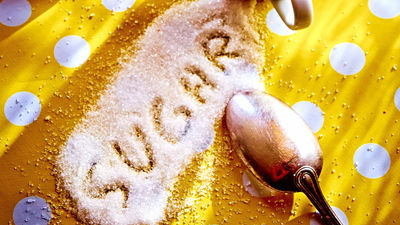PepsiCo declares to reduce sugar from carbonated beverages to solve the obesity problem

ByMike Mozart
Americans eat not "breakfast" but almost "dessert"It is said that it is said to be said that in the United States 70% of adults are said to be overweight and an additional 29 million people are listed as one of the "obesity powers" suffering from diabetes. While obesity is no longer a national problem, we offer products such as carbonated beverages such as "Pepsi" and "Mountain Dew"PepsiCoAnnounced an agenda (plan), including reducing sugar contained in products by 2025.
PepsiCo Launches 2025 Sustainability Agenda Designed to Meet Changing Consumer and Societal Needs
http://www.multivu.com/players/English/7954151-pepsico-performance-with-purpose-sustainability-agenda/
To address urgent obesity crisis, PepsiCo plans slight sugar cut by 2025 | Ars Technica
http://arstechnica.com/science/2016/10/to-address-urgent-obesity-crisis-pepsico-plans-slight-sugar-cut-by-2025/
PepsiCo announced the "Sustainability Agenda" formulated to continue business growth while responding to future customer and society needs. Among them, providing healthier foods, consideration for water resources, reduction of greenhouse gas emissions, etc. are included in the beverage as one of its effortsAdded sugar contentIt is mentioned that it reduces.
As for the contents written as items, "aim to reduce the calories by added sugar per 12 ounce can (350 ml can) to 100 kcal or less in at least two-thirds of PepsiCo beverages by 2025 This includes focusing on zero calorie drinks and low calorie drinks ", but despite our efforts to the end, we are setting a direction to reduce excess sugar supply.

"Sugar added" is the sugar that is added to sugar contained in ordinary raw materials, which is supposed to be regarded as problematic as having the effect of promoting people's obesity. It is well known that many added sugars are also used in carbonated drinks, for example, 150 kgca · 41 g of sugar per 12 ounce can is added to Pepsico's carbonated beverage "Pepsi" , This corresponds to 10.25 teaspoons. In addition, the company's "Mountain Dew" adds 170 kcal · 46 g sugar, and in the bottle "Frappucino" sold in the Starbucks brand, if 290 kcal · 46 g sugar is added Thing.
This means that the guideline by the US government will equal the target value of "to limit the added sugar content by 10% or less of the daily caloric intake" with just one drink I mean it. In the United States, it is recommended to limit the calorie intake per day to 2,000 kcal or 2,500 kcal, but if it is 10% then it will be 200 kacal ~ 250 kcal, so most of it is ingested by drinking one can of Pepsi I will.

ByJavier Rapoport
And according to the report of the US government, the majority of Americans have exceeded this target value, especially carbonated drinks, energy drinks, alcoholic beverages, etc. are the sources of the largest added sugar. In the United States many adults are in obesity, 29 million people suffer from obesity diabetes, and there are also data that 86 million people become diabetes preliminary groups. In order to deal with this, the FDA (Food and Drug Administration) in the United States revised the form of nutritional ingredient labeling to be posted in food as follows, the new form (right) makes the calorie notation stand out, add sugar content (Added Sugar) is included as an individual item. It is said that this change will be implemented from 2018.

Regarding beverages containing a large amount of sugar, WHO (World Health Organization) has clarified the policy that it is a problem, and introducing "soda tax" to the leaders of countries around the world, It is suggested that carbonated beverages should be avoided as much as carbonated beverages containing many of them. WHO shows the view that "the introduction of tax can reduce people's health hazard and save lives."
WHO | WHO urges global action to curtail consumption and health impacts of sugary drinks
http://www.who.int/mediacentre/news/releases/2016/curtail-sugary-drinks/en/
Companies such as PepsiCo and Coca-Cola show that they are against the adoption of this type of tax system and introduction of new nutritional indicators, and it seems that they are investing in lobbying to parliament by investing money. Certainly, there are parts that make excessive turning point of problem to only soda, but it is also undeniable that supply source of added sugar, which is said to be suppressed, is soda and too sweet food It seems likely to be said that it is important to consciously consciously take over sugar by consumers themselves without relying on manufacturers and government measures alone.
Related Posts:
in Junk Food, Posted by darkhorse_log







